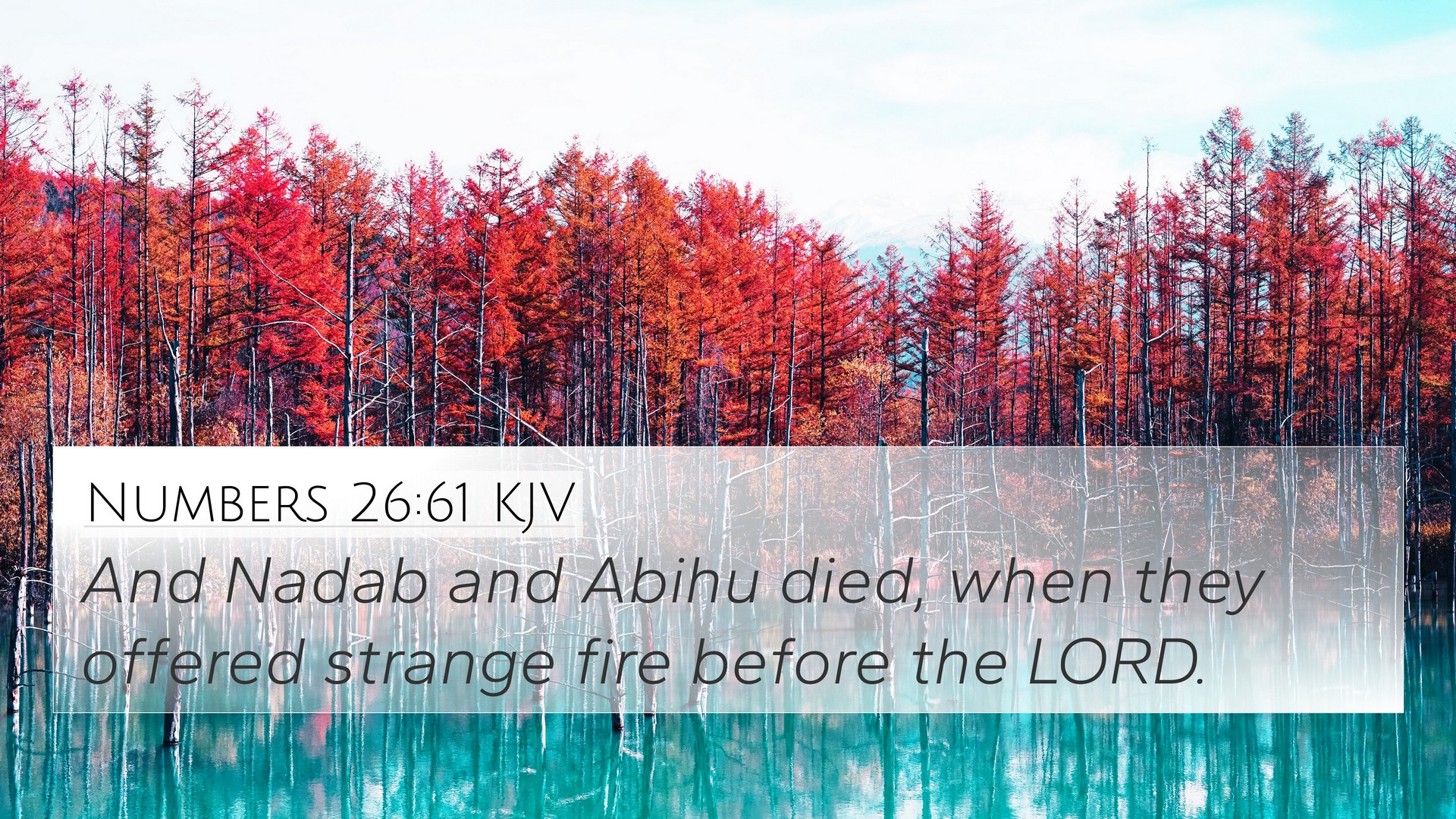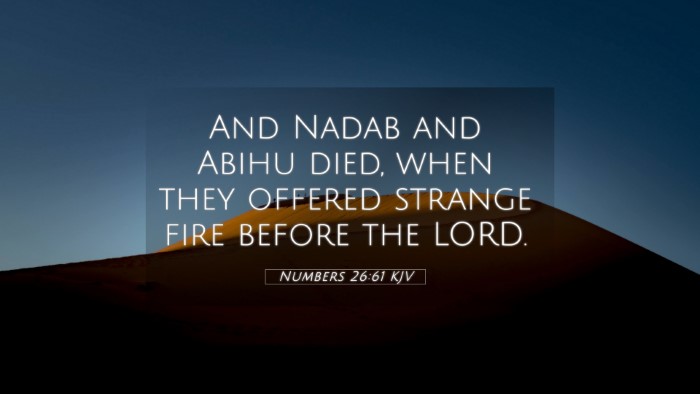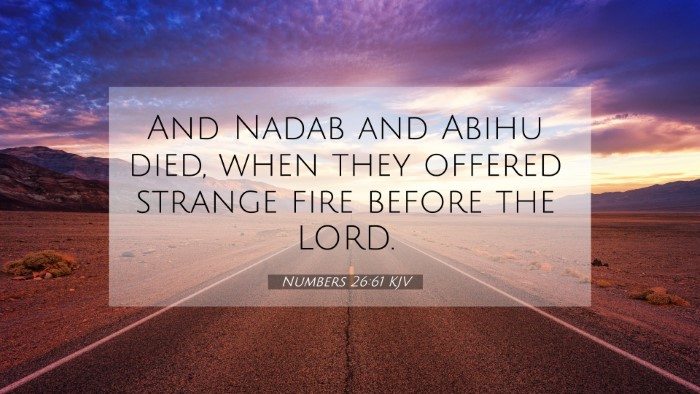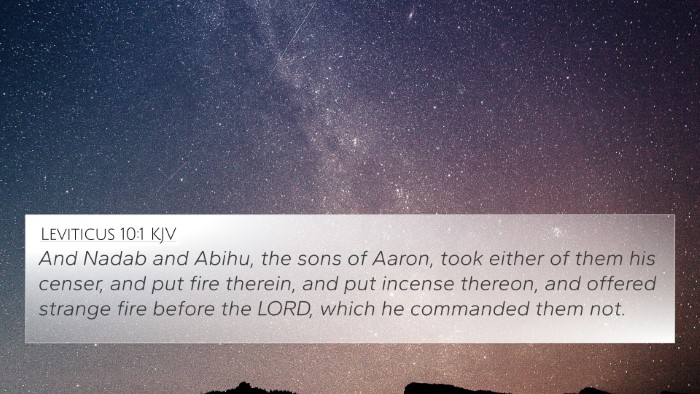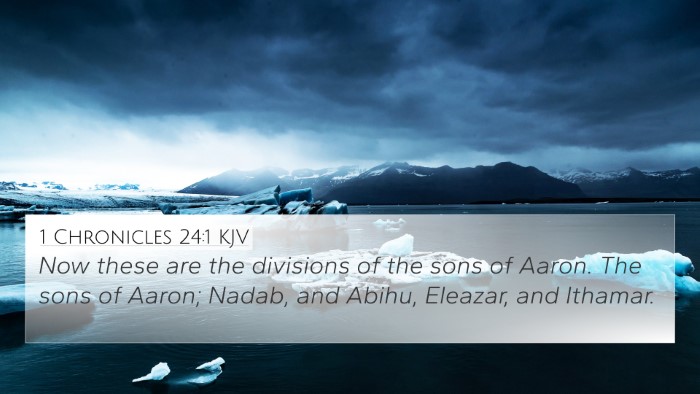Understanding Numbers 26:61
Verse Text: "And Nadab and Abihu died, when they offered strange fire before the LORD." (Numbers 26:61, KJV)
Introduction
Numbers 26:61 recounts a tragic event involving Nadab and Abihu, the sons of Aaron, emphasizing the severity of disobedience in serving God. This verse captures the essence of divine judgment upon improper worship practices, demonstrating how the Lord maintains holiness within His covenant community.
Commentary Insights
Matthew Henry’s Commentary
Matthew Henry reflects on the death of Nadab and Abihu, viewing it as a stark reminder of the consequences of unauthorized worship. He underscores that their demise serves as a warning to present-day believers about the importance of adhering to God's commands in worship. The term "strange fire" signifies worship that is contrary to divine instruction, highlighting the necessity of purity in spiritual practices.
Albert Barnes’ Commentary
Barnes expounds that Nadab and Abihu's actions demonstrate a reckless approach to worshiping God, which ultimately led to disastrous results. Their offering of "strange fire" symbolizes a deviation from the prescribed rituals established by God. This incident illustrates the seriousness with which God regards the elements of worship, mandating that His followers approach Him with reverence and adherence to scriptural authority.
Adam Clarke’s Commentary
Adam Clarke delves into the implications of this event within the context of the Israelite community. He notes that the punishment of Nadab and Abihu serves not only as a personal judgment but also as a communal lesson for the Israelites to understand the sanctity of God's commandments. Clarke emphasizes that God’s requirements for worship are non-negotiable, reflecting His character and expectations for holiness among His people.
Theological Reflections
The tragedy of Nadab and Abihu, as recorded in Numbers 26:61, serves as a theological anchor to understand the broader themes of holiness and obedience to God’s ways. The implications of their actions prompt discussions on the nature of divine justice and the importance of fidelity in worship.
Related Bible Verse Cross-References
- Leviticus 10:1-2: This passage describes the specific actions of Nadab and Abihu that led to their death, providing context for the "strange fire" mentioned in Numbers 26:61.
- Exodus 30:9: Here, God lays out guidelines for offerings, further underscoring the necessity of following divine instructions in worship.
- Deuteronomy 4:2: This verse admonishes the Israelites to not add or take away from God's commands, echoing the warning seen in Numbers 26:61.
- 1 Chronicles 13:9-10: This account of Uzzah's death for touching the Ark of the Covenant reinforces the importance of approaching God with reverence.
- Hebrews 12:28-29: This New Testament passage draws on the theme of worshiping God acceptably, highlighting His consuming fire.
- Malachi 1:6-14: God’s disdain for improper offerings reflects the seriousness of Nadab and Abihu's error.
- Matthew 15:9: Jesus speaks about worshiping in vain, illustrating the continued relevance of proper worship throughout the ages.
Connecting Themes in Scripture
- Holiness: The holiness of God is a pivotal theme in both the Old and New Testaments, reinforcing the doctrine that worship must be conducted in a manner that honors God’s purity.
- Obedience: The narrative connects to various scriptures emphasizing the necessity of obedience to God’s commandments (e.g., 1 Samuel 15:22).
- Judgment: The theme of divine judgment for wrong worship practices is evident across different biblical accounts.
Application for Believers
The lesson of Numbers 26:61 transcends time, compelling contemporary believers to examine their worship practices critically. Engaging with God requires sincere adherence to His word, eschewing any form of idolatrous or improper offerings. Reflecting on this narrative instills a sense of reverence and devotion, reminding individuals that worship is a serious covenantal relationship established by God.
Conclusion
In Numbers 26:61, we find a pivotal moment that not only illustrates God's expectations for worship but also showcases His holiness and disdain for disobedience. As we draw connections through scriptural cross-referencing, the lesson remains clear: every approach to God in worship must stem from a heart fully aligned with His commandments. Through comprehensive Bible study and understanding the thematic connections within the scriptural text, believers can ensure their worship remains rooted in the truth and reverence due to our Creator.
